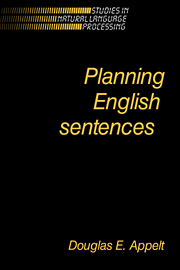Book contents
- Frontmatter
- Contents
- Dedication
- Preface
- 1 Introduction
- 2 An overview of related research
- 3 Representing knowledge about intensional concepts
- 4 Planning to affect an agent's mental state
- 5 Planning illocutionary acts
- 6 Planning surface linguistic acts
- 7 Utterance planning: an example
- 8 Utterance planning: the future
- Notes
- Bibliography
2 - An overview of related research
Published online by Cambridge University Press: 03 December 2009
- Frontmatter
- Contents
- Dedication
- Preface
- 1 Introduction
- 2 An overview of related research
- 3 Representing knowledge about intensional concepts
- 4 Planning to affect an agent's mental state
- 5 Planning illocutionary acts
- 6 Planning surface linguistic acts
- 7 Utterance planning: an example
- 8 Utterance planning: the future
- Notes
- Bibliography
Summary
Introduction
The planning of natural-language utterances builds on contributions from a number of disciplines. The construction of the multiagent planning system is relevant to artificial intelligence research on planning and knowledge representation. The axiomatization of illocutionary acts discussed in Chapter 5 relies on results in speech act theory and the philosophy of language. Constructing a grammar of English builds on the study of syntax in linguistics and of semantics in both linguistics and philosophy. A complete survey of the relevant literature would go far beyond the scope of this book. This chapter is included to give the reader an overview of some of the most important research that is pertinent to utterance planning.
Language generation
It was quite a long time before the problem of language generation began to receive the attention it deserves. Beginning in about 1982, there has been a virtual explosion in the quantity of research being done in this field, and a complete review of all of it could well fill a book (see Bole and McDonald, forthcoming). This chapter presents an overview of some of the earlier work that provides a foundation for the research that follows.
Several early language-generation systems, (e.g. Friedman, 1969), were designed more for the purpose of testing grammars than for communication.
- Type
- Chapter
- Information
- Planning English Sentences , pp. 13 - 22Publisher: Cambridge University PressPrint publication year: 1985



